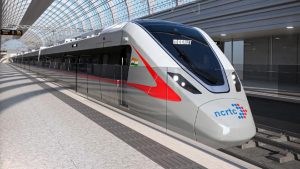 Wabtec Corporation won a USD 15 million contract to deliver critical train components for the rolling stock which will operate the Delhi-Meerut Regional Rapid Transport Systems (RRTS).
Wabtec Corporation won a USD 15 million contract to deliver critical train components for the rolling stock which will operate the Delhi-Meerut Regional Rapid Transport Systems (RRTS).
The company will supply advanced technology brake systems, pantographs, roof disconnector switches and fully integrated passenger information systems to Alstom, which is building the new trains.
All the products which will deliver will have substantial ‘Make in India’ content. The order covers 30 six-car regional commuter trains and 10 four-car metro trains, which will be built at Alstom’s Savli plant in India.
The high-performance brake system provides critical safety features, high reliability, and reduced maintenance intervals. The high-speed pantographs are aerodynamically designed to perform under different overhead electric conditions. The pantograph is equipped with state-of-the-art safety features such as an auto drop device and a maximum extension device including novel features like condition-based monitoring and smart-carbon strips.
The passenger information systems provide state-of-the-art displays, audio, CCTV, dynamic route map and infotainment with auto-diagnostic features and high reliability.
Wabtec has previously collaborated with Alstom on multiple projects. The entire fleet of 816 Alstom cars running in Delhi Metro is equipped with Wabtec’s train components.
In 2020, the National Capital Region Transport Corporation (NCRTC) awarded Bombardier Transportation which is now part of Alstom a contract to deliver 40 trains (210 cars) including the maintenance services for 15 years.
Alstom also won a EUR 106 million contract to deliver the signalling, train control and telecommunication system for the Delhi– Meerut rail corridor.
In January, the RRTS project has been inaugurated with the construction of a 4.3 km viaduct in Delhi. The regional system consists of the construction of an 82 km rail network comprising 68 km of elevated lines and 14 km of underground rail connection.
USD 3.94 billion is the estimated value of the project of which USD 1.89 billion will be the contribution of the Indian Government, USD 1 billion will be the co-financing of the Asian Development Bank (ADB), while USD 1 billion will be provided from co-financing resources.
Share on:



